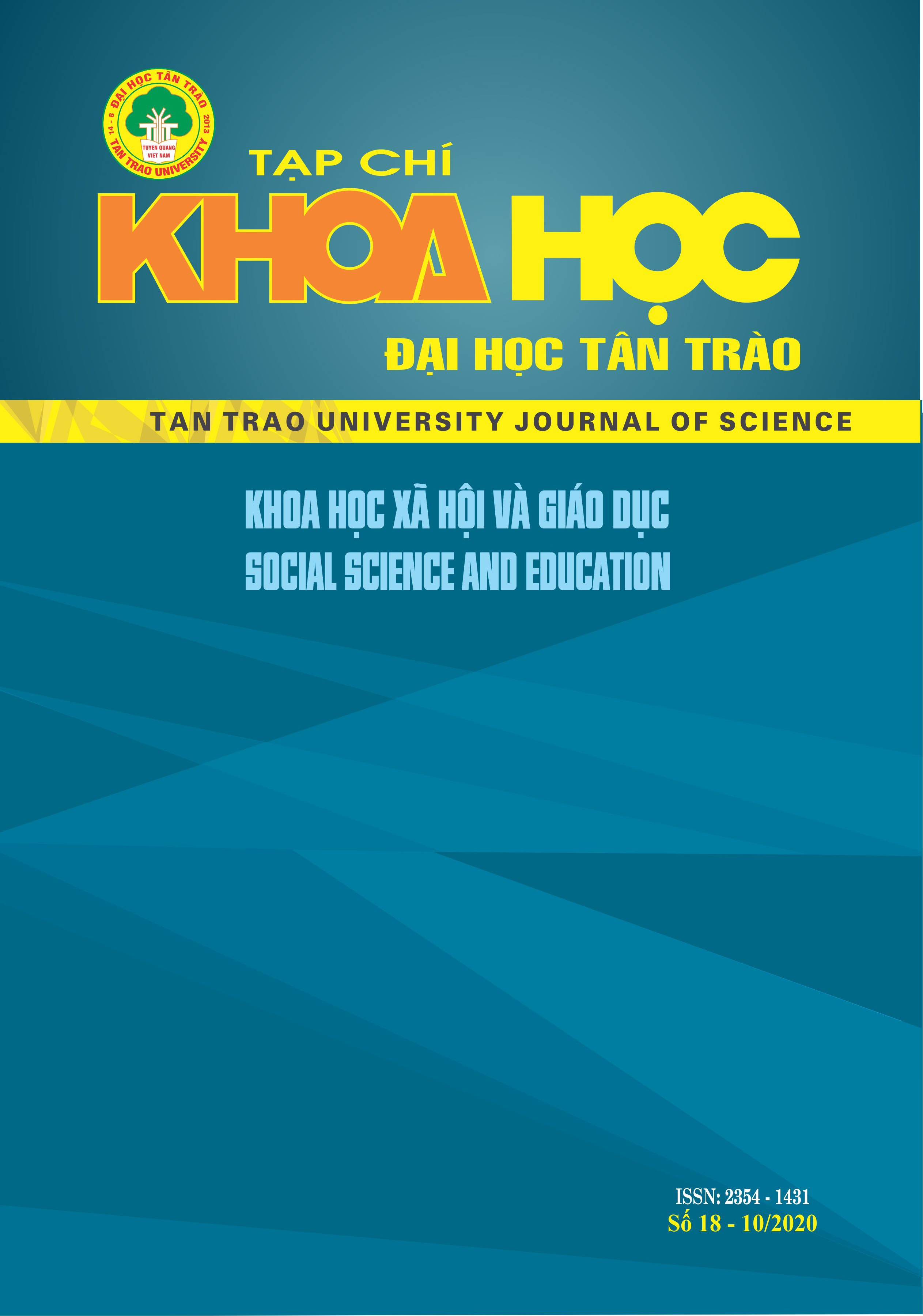TỰ CHỦ NGHỀ NGHIỆP CHO GIẢNG VIÊN CÁC TRƯỜNG ĐẠI HỌC
DOI:
https://doi.org/10.51453/2354-1431/2020/409Từ khóa:
Tá»± chủ nghá» nghiệp, tá»± chủ của giảng viên, tá»± chủ trÆ°á»ng đại há»c, phát triển tá»± chủ nghá» nghiệpTóm tắt
Giảng viên các trường đại học hiện nay đã được trao quyền tự chủ nghề nghiệp nhưng chưa nhận thức đầy đủ và mức độ tự chủ còn hạn chế. Giảng viên có mức độ tự chủ cao hơn trong các lĩnh vực giảng dạy, phát triển chương trình so với các lĩnh vực tham gia hoạt động quản trị nhà trường và phát triển chuyên môn. Bài viết nghiên cứu làm rõ khái niệm, vai trò, phạm vi và đề xuất một số giải pháp phát triển tự chủ nghề nghiệp cho giảng viên đại học.
Tải xuống
Tài liệu tham khảo
1. Hoang Thi Kim Hue (2017), Developing professional autonomy for lecturers of pedagogical universities, PhD thesis, Hanoi University of Education.
2. Nhu Nguyen (2000), UNESCO World Declaration and International Conference on Higher Education, Translation of the original French text of the 30th UNESCO Plenary Meeting on August 31, 1999 in Paris, PICMS Information Database Questions and answers to the National Assembly of the Information Department, Center for Information - TV - Scientific Research, Office of the National Assembly.
3. Glass, S. R.(1997). Markets & Myths: Autonomy in Public and Private Schools. Education Policy Analysis Archives. Vol.5 No.1.
4. Jane Muceke Ng‟ethe1, Dr. Mike E. Iravo, G.S. Namusonge (2012), Determinants of Academic Staff Retention in Public Universities in Kenya: Empirical Review, International Journal of Humanities and Social Science Vol. 2 No. 13; July 2012
5. Kevin Dale Gwaltney (2012), Teacher autonomy in the Unites States: stabling a standard definition, validation of a nationally representative construct and an investigation of policy affected teacher group, A Dissertation presented to the Faculty of the Graduate School at the University of Missouri-Columbia.
6. Littlewood, W. (1996). “Autonomy”: An anatomy and framework. System, 24, 427-435.
7. Little, D. (1995). Learning as dialogue: The dependence of learner autonomy on teacher autonomy. System,
8. Mark A.Smylie (1992), Teacher Participation in School Decision Making: Assessing Willingness to Participate, Education Evaluation and Policy Analysis. Spring, 1992, Vol.14 No.1, pp.53-76.
9. Oksana A.Gavriliuk and Anastasiya V.Lakhnoa (2013) Professional Autonomy of a University Teacher in the USA and Russia: Freedom from control or Freedom for Development?, Journal of Siberian Federal University. Humanitie & Social Sciences 3, pp 455-467
10. Oksana A. Gavrilyuk et al, (2015), University Autonomy and Teacher‟s Academic Freedom in Modern Russia: Challenges and Opportunities, International Journal of Humanities Social Sciences and Education (IJHSSE) Volume 2, Issue 10, October 2015, PP 8-15 ISSN 2349-0373 (Print) & ISSN 2349-0381 (Online) www.arcjournals.org ©ARC Page | 8).
11. Richard M.Ingersoll (1996). Teachers‟ Decision-Making Power and School Conflict. Sociology of Education, Vol 69 (April), 159-176.
12. Richard C. Smith (2001), Teacher education for teacher-learner autonomy, Centre for English anguage Teacher Education (CELTE) University of Warwick, UK
13. Rosalba Cárdenas Ramos, (2006) Considerations on the role of teacher autonomy, Colombian pplied Linguistics Journal, No 8, pp. 183-202.
14. William Edward Moonmaw (2005), Teacher-percaived autonomy: a construct validation of the eacher autonomy scale, In partial fulfillment of the requirements for the degree of Doctor of Education.
15. T.S.M. Amarasena (2015), The impact of work autonomy on job satisfaction of academic staff: an empirical examination of government universities in SriLanka, International Journal of recent advances in organizational behavior and secision sciences (IJRAOB) An online International research journal, 2015 Vol:1 Issue 4.
Tải xuống
Đã Xuất bản
Cách trích dẫn
Số
Chuyên mục
Giấy phép

Tác phẩm này được cấp phép theo Giấy phép Quốc tế Creative Commons Attribution-ShareAlike 4.0 .
Bài báo được xuất bản ở Tạp chí Khoa học Đại học Tân Trào được cấp phép theo giấy phép Ghi công - Chia sẻ tương tự 4.0 Quốc tế (CC BY-SA). Theo đó, các tác giả khác có thể sao chép, chuyển đổi hay phân phối lại các bài báo này với mục đích hợp pháp trên mọi phương tiện, với điều kiện họ trích dẫn tác giả, Tạp chí Khoa học Đại học Tân Trào và đường link đến bản quyền; nêu rõ các thay đổi đã thực hiện và các nghiên cứu đăng lại được tiến hành theo cùng một bản quyền.
Bản quyền bài báo thuộc về các tác giả, không hạn chế số lượng. Tạp chí Khoa học Tân Trào được cấp giấy phép không độc quyền để xuất bản bài báo với tư cách nhà xuất bản nguồn, kèm theo quyền thương mại để in các bài báo cung cấp cho các thư viện và cá nhân.
Mặc dù các điều khoản của giấy phép CC BY-SA không dành cho các tác giả (với tư cách là người giữ bản quyền của bài báo, họ không bị hạn chế về quyền hạn), khi gửi bài tới Tạp chí Khoa học Đại học Tân Trào, tác giả cần đáp ứng quyền của độc giả, và cần cấp quyền cho bên thứ 3 sử dụng bài báo của họ trong phạm vi của giấy phép.


